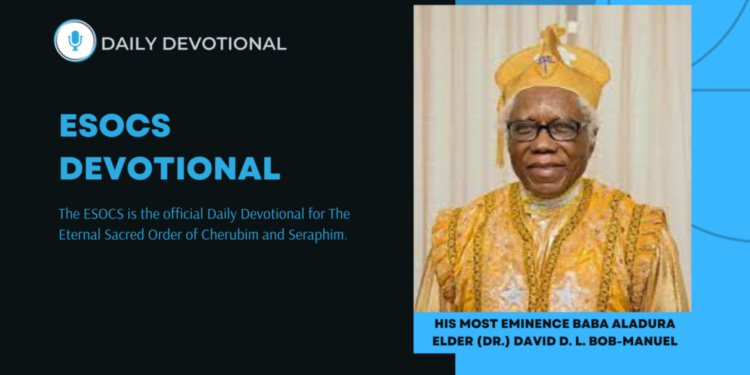ESOCS Devotional 13 January 2025 – Lessons From Moab
MEMORY VERSE: “The burden of Moab. Because in the night Ar of Moab is laid waste, and brought to silence …” Isaiah 15: 1
TEXT: ISAIAH 15:1-END
The burden against Moab.
Because in the night Ar of Moab is laid waste
And destroyed,
Because in the night Kir of Moab is laid waste
And destroyed,
2 He has gone up to the temple and Dibon,
To the high places to weep.
Moab will wail over Nebo and over Medeba;
On all their heads will be baldness,
And every beard cut off.
3 In their streets they will clothe themselves with sackcloth;
On the tops of their houses
And in their streets
Everyone will wail, weeping bitterly.
4 Heshbon and Elealeh will cry out,
Their voice shall be heard as far as Jahaz;
Therefore the armed soldiers of Moab will cry out;
His life will be burdensome to him.
5 “My heart will cry out for Moab;
His fugitives shall flee to Zoar,
Like a three-year-old heifer.
For by the Ascent of Luhith
They will go up with weeping;
For in the way of Horonaim
They will raise up a cry of destruction,
6 For the waters of Nimrim will be desolate,
For the green grass has withered away;
The grass fails, there is nothing green.
7 Therefore the abundance they have gained,
And what they have laid up,
They will carry away to the Brook of the Willows.
8 For the cry has gone all around the borders of Moab,
Its wailing to Eglaim
And its wailing to Beer Elim.
9 For the waters of Dimon will be full of blood;
Because I will bring more upon Dimon,
Lions upon him who escapes from Moab,
And on the remnant of the land.”
Read Other ESOCS Devotional Here
Moab is the son of Lot and his daughter, the son of an incestuous relationship, after they escaped from Sodom and Gomorrah (Gen. 19:30-38). Later on, the Moabites become the enemies of Israel. Balak the king of Moab tried three times to curse Israel through Balaam, because Israel was numerous and he was afraid (Num. 22:1-6). Israel was also commanded not to mix with Moab, for they caused God’s people to turn away from God and to idols (Num. 25:1-5). In 2 Kings 1:1, 3:1-5, we read of how Moab rebelled against Israel after King Ahab died. Yet, though they were deemed as enemies of Israel, God also used Moab for His purposes (Judg. 3:12-30). In Deuteronomy 2:9, we read that God also gave them land for possession, indicating some form of a relationship with God. In 1 Samuel 22, the king of Moab had kept David’s parents safe when he had to flee from Saul and this indicated that there was a certain level of trust.
What is the significance of Moab? We see much overlap in the history and relationships of these two nations. The relationship between Israel and Moab varied, and at times it was good, while at other times, it was bad. As we read Isaiah 15, it is clear that Isaiah and God Himself mourn as they pronounce destruction and judgement on Moab. There is an emotional response, with weeping, and sorrow directed against them, even as this oracle is being delivered.
As God’s people, do we mourn and weep for the lost? Where is our heart for the people who are disobedient, whom we know are headed towards disaster? Do we weep for them, like God? Do we have the same heart as God? Do we even care, or are we more worried about how we look? Are you more comfortable dealing with the Christians in your church than in trying to reach the lost? Not just more comfortable — would you rather talk to Christians than non-Christians, and why? Is it because we all speak the same lingo, or is it because we can’t get over ourselves and how people will view us as “that Christian person”?
Isaiah fleshes out a picture of destruction, death and mourning in Isaiah 15:1-4. The verses mention places that can be easily identifiable on the map and when we read it, we can trace the destruction that God promises is coming. God announces swift and immediate destruction and judgement on two cities of Moab. Overnight, this nation is undone (Isa. 15:1). Isaiah 15:2 gives us a picture of a Moabite running to his pagan gods for protection and weeping — a picture of futility, especially as we read on. On every head is baldness, every beard is shorn — these are images of mourning, death and weeping, of pure devastation and the effects it has. Who do you clutch to when issues of life arise? Learn from Moab today and return to God alone.
CHALLENGES
- How much do you cherish having a good relationship with God? Think about it.
PRAYER POINT
- Lord, help me to always be in track with thee. Amen.
FURTHER READING: Isaiah 16:1-end; Matthew 16:1-end
ESOCS Devotional 13 January 2025















